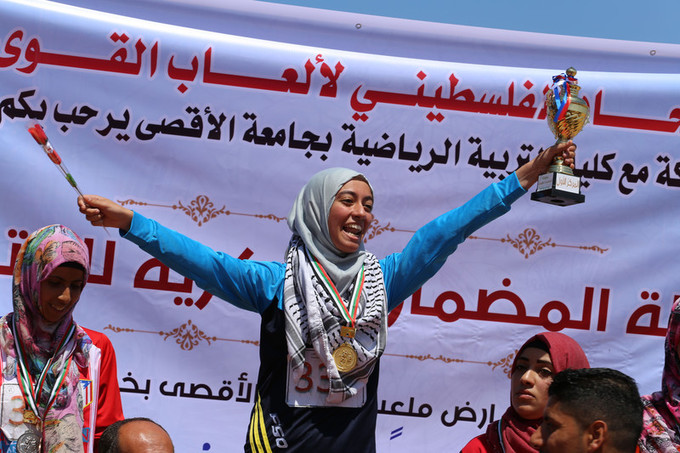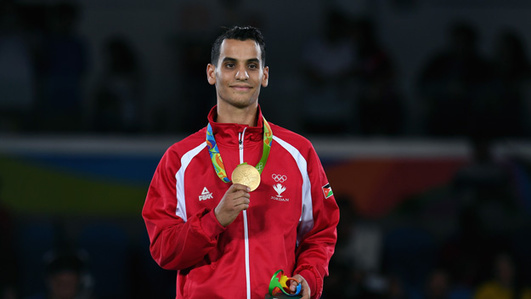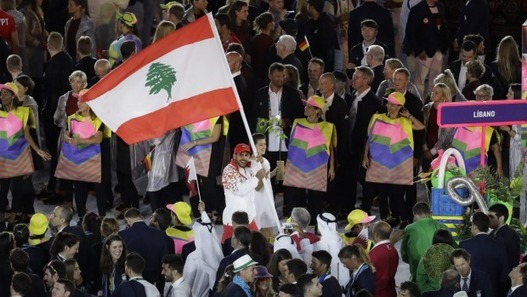
Isra Saleh el-Namey
The Electronic Intifada
Inas Nofal celebrates after winning a race in Gaza City in April. Khaled Omar Xinhua
After Rio, Tokyo.
Around the world, ambitious young athletes have already trained their sights on the next Olympic Games, dedicating time and effort to fulfilling their hopes and dreams.
And for few is this truer than Inas Nofal, a 15-year-old runner from Gaza, whose dedication to her sport is not only driving her own progress, but inspiring others.
“Running is an integral part of my life. I cannot spend a day without running for at least one hour,” Inas said.
The teenage runner has big dreams. She is committed to an exhausting daily training schedule in order to become good enough to compete at the international level.
“My dream is to represent Palestine at international tournaments,” said the young athlete who has not yet settled on her favorite distance. “I need to exercise hard to sharpen my skills so that I can be well-prepared for any future race I might be lucky enough to join.”
Inas starts her exercise routine in the cool early morning hours, racing down the streets of Maghazi refugee camp in the central Gaza Strip where she lives. She is usually accompanied by her coach, Sami al-Natil, a former athlete who now devotes his time to guiding and training promising young athletes.
Al-Natil takes running seriously. “I want everyone in Gaza to understand how important running is for health and relaxation,” he said. Running, he added, is not just a sport: it’s a lifestyle.
Inas has impressed al-Natil with her attitude and courage. Everyone in Gaza, the coach emphasized, could learn from her example.
“Inas has remarkable talent,” the 38-year-old instructor said. “She deserves to be given a proper chance.”
A year of hard work
When Inas first began training with al-Natil a year ago, her strides were short and she got tired quickly. Now, a run of 10 kilometers takes her just 50 minutes, still a long way off any Olympic or world record, but a huge leap forward for her.
She has, according to her coach, shown great perseverance. She also has enormous belief in her own abilities. Both have allowed her to push herself to do what she might previously have thought impossible.
The youngest of four girls, Inas is fully supported by her sisters. Rana, 22, the sister with whom she shares a bedroom, even on occasion goes along for a run. “We are all very proud of her for doing this,” Rana said.
But her strongest supporter is her father who firmly believes in his daughter’s talent.
“I was convinced when she took first prize at a local competition last year,” Muhammad Nofal, 48, said while showing off his daughter’s medal for winning that 800-meter race.
Nofal, a civil engineer, does not think much of conventions of a conservative society that would discourage girls from being publicly involved in sports and physical exercise generally.
“I think that this is an erroneous stereotype that needs to be changed. I think if there are enough examples of girls wearing the hijab [headscarf] and still excelling at sport this can happen,” he said. “I hope that my daughter can present such an example for girls who would otherwise have been scared of becoming athletes.”
In fact, more girls have started to join Inas when she trains. And she’s pleased friends have joined her in a little group that occasionally runs together.
Obstacles
Meanwhile, the young athlete is focused on improving her CV. In early April, she won another local race, this time over three kilometers. But, at the same time, she was frustrated in her ambition to contest the Palestine Marathon in and around Bethlehem when she was denied an exit permit to attend the West Bank race.
She was not alone. Israeli military authorities refused to allow more than 100 Palestinian athletes from Gaza the permits they needed to take part in the marathon.
“I was extremely frustrated,” said Inas, who had dreamed of a first competition in the West Bank.
But she may have to learn to deal with such frustrations. In 2013, for the first edition of what was then called the Bethlehem marathon, Israel prevented 26 Palestinian runners from Gaza from participating, among them Sanaa Abu Bakhit.
Abu Bakhit was the first female Olympian from Gaza. The 800-meter runner represented Palestine at the 2004 Athens Olympic Games when she was just 19, carrying the Palestinian flag at the opening ceremony.
Since then, however, the Deir al-Baleh-based runner has faced obstacle after obstacle to pursuing her passion.
“It was a great honor for me to participate on behalf of my country,” Abu Bakhit told The Electronic Intifada. “I was hoping to pursue such contests for years, but the sealed crossings and tight Israeli restrictions made it nearly impossible.”
There is also expense to consider. Ideally, athletes train on special tracks and adhere to specific training regimes to guarantee progress. All this entails cost and is complicated by the circumstances in Gaza.
For instance, while Inas uses a treadmill at home, it only works when the power is on, which is sometimes less than eight hours a day.
Al-Natil tries to ensure there is a variety in the training Inas does anyway. When the electricity is off, Inas can do sit-ups and similar exercises instead of the treadmill.
Defying conventions
As she has stepped up her training, Inas is also spending more time pounding the streets and coastline where she lives. This has exposed her to a public sometimes disapproving of the running girl.
It has not, however, deterred the Olympic aspirant who says she will “keep running toward my dream.” And her coach says he is starting to notice a more open attitude toward the idea of female athletes.
Girls are also now getting more official support.
The head of the Palestinian Union for Athletics in Gaza, Nader Halawa, said the union is fully supportive of girls partaking in all kinds of sports.
“We are proud of our girls, and will do everything at our disposal to help them reach international standards by entering them into international competitions,” Halawa asserted.
For now, Inas — who says her role models are former Moroccan hurdler Nawal el-Mutawakel, who took gold in 1984, and Maryam Jamal, the Bahraini 1,500-meter runner who took bronze in London 2012 — has her sights firmly set on Tokyo 2020.
“I will be 19 years old then. And I aim to take gold,” said the ambitious runner. “Why not?”
Source: electronicintifada.net







